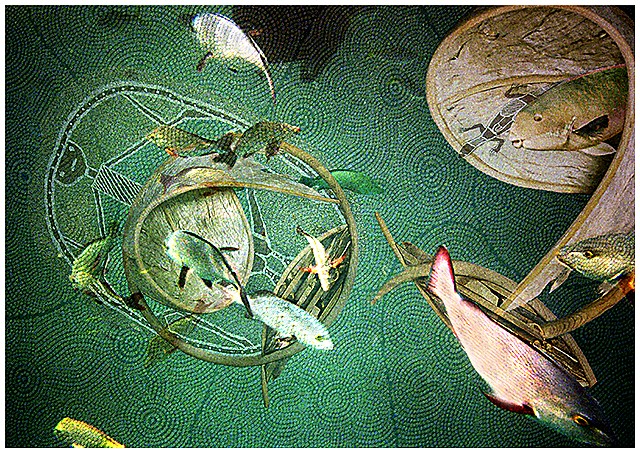Writing—Canzoni della Strada—Songs of the Road

Parramatta—Place Where Eels Lie down
Pigment Print on Rag Paper
PARRAMATTA—Place Where Eels Lie Down
Can you see the tears forming in the corners of thousands
of eyes earnestly looking for a path home in the deep sea?
Can you feel the fear flowing through their gills as a short journey
from one coral formation to a hiding place between two rocks
becomes a perilous adventure through a maze of predators?
Can you imagine in the midst of a peaceful summer day what it's
like for a band-tail puffer to cede its territory to a voracious barramundi while their offspring are taken from them—never to be seen again?
Can you sense the loss of hope from a peacock flounder bubbling to the surface in search of the illusive light—caught and swallowed
by a cavernous mouth quivering with an insatiable bearing?
They say that Parramatta, the place where eels lie down,
is dark, shrouded and secure—but it's a transitory illusion
shattered by the turbulence of teeth showing no regard
for a refuge sanctified by the denizens of coral.
Those who dwell in their blue home have learned that
the waves of justice swim with no direction and are known
to crash on any shore—leaving behind the temporal shape of
a promise nestled in a cavern under a bed of seagrass.
PULSE
Let loose in the silent night —a beat, a flutter, a burst—lodging in the lungs after a shortcut through muscle and a right turn below the heart.
One, two, three, one, two, three, one, two, three…The cadence of a waltz swirling in a continuous motion—a shiver sways into a shimmy—wobbling after a frivolous shake.
Light and sound seize a current, a modulating wave,rolling and rippling in rhythm—answering a call in the blink of an eye.
The globe spins with abandon, wavering between red and black—stopping on a random number. Does the house win again?
BIRD SONGS—The Passing of Winter (Norway)
They sing about their lives on the water—warbling, chirping, and chatter floats through the canyons and trees, waking up the morning.
As the old Gospel song proclaims, "hope can be found by keeping your eye on the sparrow, that small bird that gains strength from the flock as it belts out tunes of joy and freedom.
But what about the winter when breath stands still and frost fills the air—do they grow more feathers—do their feet freeze—are their nests caked in ice—do their songs retreat into the darkness waiting for the Earth to tilt closer to the sun?
The answer might lie in the origin of song— simple sounds for gossip, courtship, and danger, bringing order to random cacophony, harmony to the orchestration of nature.
Charlie Parker, Jerry Garcia, and Mahalia Jackson conjured birds in their music, bringing notes to the scattered sounds of rapture and relief—flight captured on keys, beaks bopping the bass. They joined the birds on the branches to record the passing winter, and the birth of better days.
(Bird Song Notes: “Bird Song” by Jerry Garcia (for Janis Joplin),
Charlie Parker “Bird” (melodic lines like birdsong), Mahalia Jackson “His Eye on the Sparrow”) [Special Grammy Award 2010]
IS THERE LIFE ON MARS?
Who owns the Earth? Is it whoever is bigger and stronger?
Who owns the sky? Is it whoever is smarter or more cunning?
Who owns the planets? Is it whoever is there first?
The Mars Rover has landed. Three hundred million miles from Earth— The product of the finest minds of the modern age— a new frontier christened with the burden of expectation.
Should we build a mall on Mars? Only if it is assured that they will
spend.
Should we strip the crust to the core? Only if analysts guarantee the
yield.
Should we displace the indigenous life? Only if they’re squatting on the spoils.
Greed and destruction have landed. Scars formed by years of indifference— a new millennium to be shaped by the hand of illusion.
(•Three billion people live on less than 2 dollars a day.
•Twenty-two thousand children a day die from conditions due to poverty.
•1.7 trillion dollars a year are spent on the world’s militaries)
[Statistics from UNICEF and Globalissues.org]
WHAT GETS YOU UP IN THE MORNING?
"When you wake up in the morning, Pooh," said Piglet at last, "what's the first thing you say to yourself?"
"What's for breakfast?" said Pooh. "What do you say, Piglet?"
"I say, I wonder what's going to happen exciting today?" said Piglet.
Pooh nodded thoughtfully. "It's the same thing," he said.
(A.A. Milne from Winnie the Pooh)
What Gets You Up in the Morning?
Porridge in the morning, steam on a cup of tea, a reverence for light, the mystery of fire, biking to work, rolling in the snow, watching flowers grow, finding that illusive answer.
In Danish it’s Hygge, Lagom in Swedish, Gemütlichkeit in German, Fargin in Yiddish, Jugaad in Hindi, Ikigai in Japanese, Mbuki-Mvuki in Bantu, and Xìngfú in Chinese.
It’s the stillness inside that transcends words—learning to recognize joy and beauty, feeling love and hope, expressing morality and compassion, pulling a soft blanket over your shoulders to harness warmth and tame the darkness of winter.
Plato, Socrates, and Aristotle found it in eudaimonia, thought giving way to the spirit—arriving at virtue. Camus searched for meaning and purpose, marveling at the will of Sisyphusas he keeps pushing his rock.
It guides us through the seasons, overcomes nostalgia and melancholy,
tunes in the sound of wind whistling through trees, gathers the luster of moonlight on water, and recalls memories as we find ourselves opening the door to take on a new day.